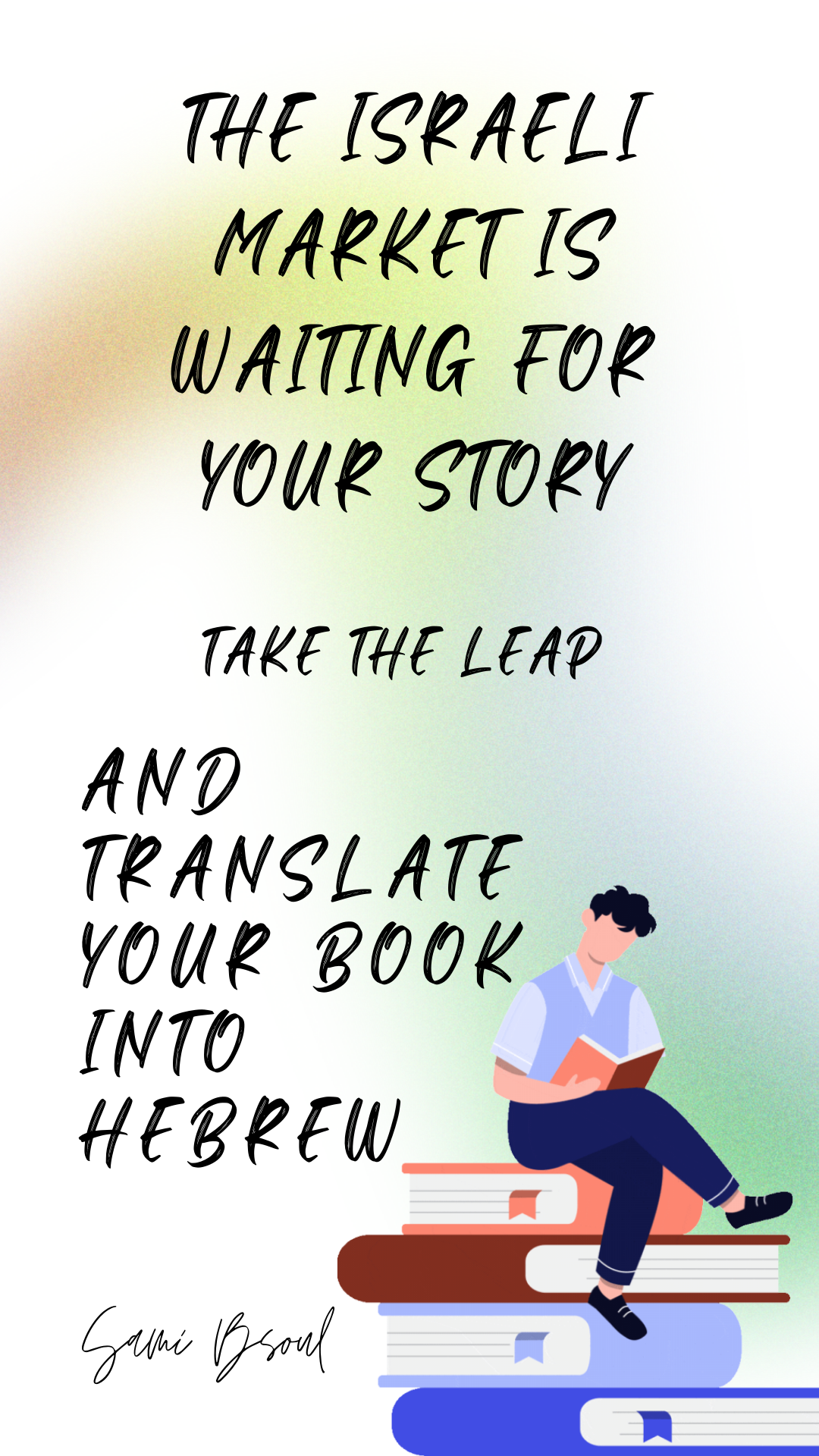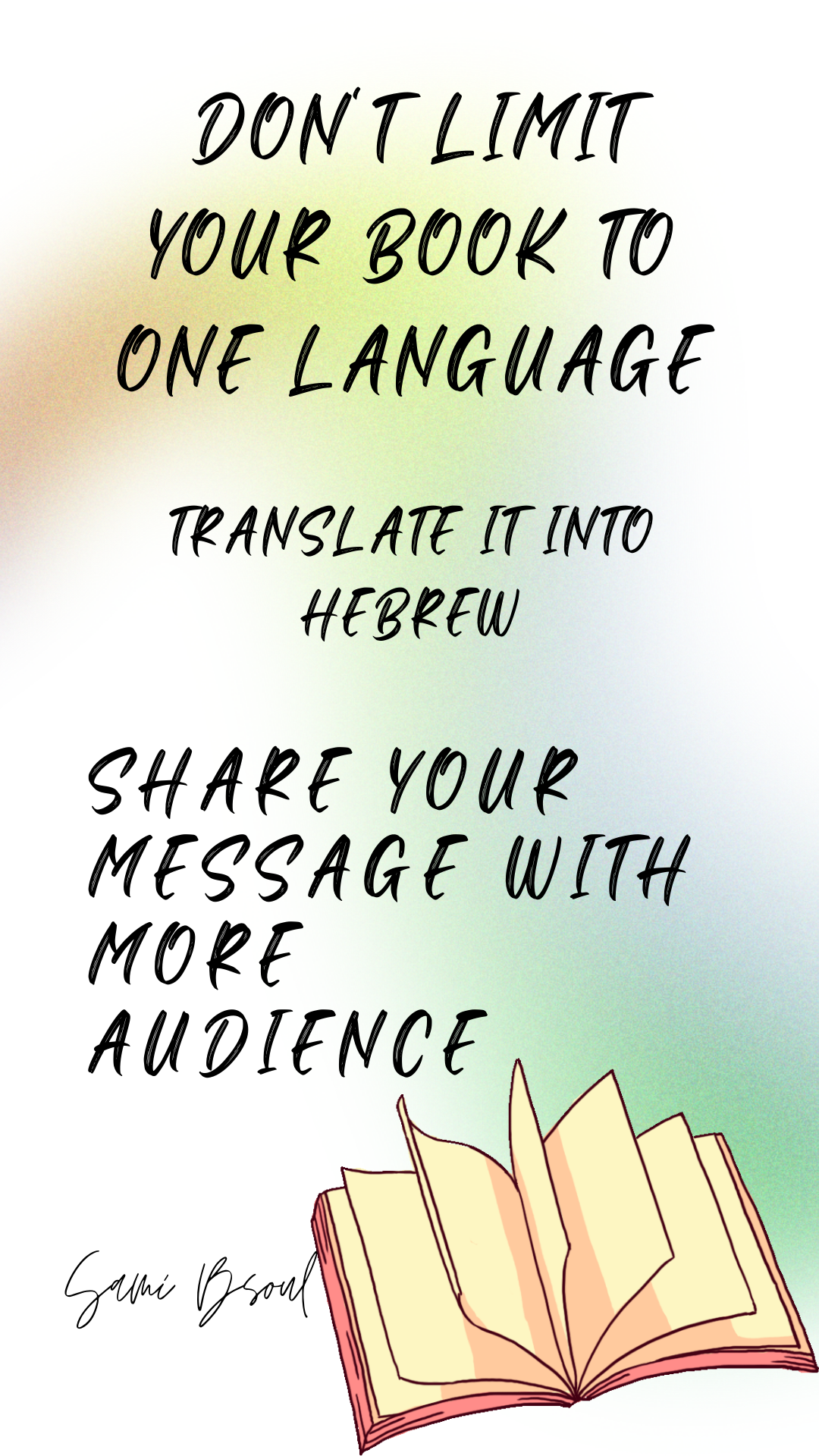Beyond Borders: The Power of Translating Your Book into Hebrew
Beyond Borders: The Power of Translating Your Book into Hebrew
By Sami Bsoul
Expanding a book's reach by translating it into a different language is a significant decision that requires careful consideration of both the potential benefits and costs. In this article, I will delve into the advantages and challenges of translating a book into Hebrew and help you determine if it's a worthwhile investment for you as an author.

The National Library of Israel's publishing report for 2020 shows that the majority of translated books were from English, comprising 74% of all translated books, up from 67% in 2019.
-
French, German, and Spanish were the next most commonly translated languages, each accounting for 6%, 3%, and 3% of translated books, respectively.
-
The remaining 26 other languages made up the rest of the translated books, highlighting the importance of translation in making literature accessible in different languages.
-
These statistics underscore the continued dominance of the English language in the global publishing industry.

First, it is important to understand the market for Hebrew books. Hebrew is the official language of Israel, and is spoken by approximately 9 million people worldwide. Israel is a small country, but has a high level of literacy and a strong cultural and literary tradition.
-
According to WorldPopulationReview, as of the latest United Nations data, the population of Israel is estimated to be 9,149,715.
-
By July 1, 2023, the population is projected to increase to 9,174,520.
-
The projections show that Israel's population is expected to continue to grow throughout the 21st century.
-
In 2020, the population was 8.66 million, and it is expected to reach 12.72 million by 2050 and 18.06 million by 2099.
-
This indicates that by the end of the century, Israel's population will be more than twice what it is today.
Hebrew language books are widely read and respected in Israel and in the Jewish community around the world, providing an enthusiastic audience for translated works.
Translating a book into Hebrew can be a worthwhile investment for authors seeking to expand their readership and brand. Despite the potential costs of translation, the benefits of accessing the Israeli and Jewish market and expanding the book's international reach can be significant. Translating a book into Hebrew can provide access to international literary awards and recognition.
The International Man Booker Prize, for example, has been awarded to several Hebrew language books, which may not have received the same recognition if they had not been translated.
Expanding the author's brand and platform, as well as potentially leading to more translation deals and broadening the book's readership, are some of the benefits of translating a book or novel into Hebrew. For example, authors with Jewish or Israeli themes or subjects may find the Israeli market particularly attractive, and translating their book into Hebrew can provide them access to it. The Hebrew readership is passionate about literature, and there is a strong cultural identity linked with reading and writing in Hebrew. By demonstrating a willingness to reach out to new cultures and languages, authors can open up opportunities for increased exposure and recognition among a dedicated audience.
While the costs of translation can be substantial, including hiring a professional translator and promoting and distributing the book in Israel and other Hebrew-speaking communities, these costs may be outweighed by the potential benefits. The return on investment may not be immediate, but the long-term benefits of reaching a dedicated audience and gaining international recognition can be significant.
It is important to consider that translating a book into Hebrew requires a certain level of cultural adaptation and understanding. Professional translators who can capture the nuance and complexity of the original work should be hired to ensure that the translation resonates with Hebrew readers.
The decision to translate a book into Hebrew should be based on an author's specific goals and priorities. While translation can be a valuable investment for authors seeking to expand their readership and brand, it may not be the right decision for everyone. It is important to weigh the potential costs and risks before proceeding with translation.

Lost in Translation: What Authors Should Consider When Translating Their Books Into Hebrew
-
Target audience: Consider the demographics of the target audience for the translated version of the book. Will the content resonate with them? Is there a significant demand for books in this genre or topic in that language and culture?
-
40.1% of Israelis aged 16 to 65 read books at least once a week. This percentage is slightly higher than the average in OECD countries, which stands at 37.2%.
-
In the field of reading, women surpass and read more than men. While half of women (47%) read books, novels, or non-fiction books at least once a week, only about a third of men (33%) read books with the same frequency.

-
Cultural differences: Authors should consider any cultural differences between the original language and the Hebrew language that may affect the translation, such as idioms, humor, and references to local customs and traditions.
-
Quality control: Authors should take an active role in ensuring the quality of the translation, by working closely with the translator, editor, and proofreader to ensure that the final product is accurate and faithful to the original version.
-
Translator: Choosing the right translator is critical to ensuring the quality of the translation. Authors should look for a qualified and experienced translator who is not only fluent in Hebrew but also has knowledge of the culture and nuances of the target audience.
-
Time-frame: Translating a book can take time, and authors should consider how long it will take to complete the translation and any related tasks such as editing and proofreading.
-
Goals and expectations: Authors should have clear goals and expectations for the translated version of their book, such as expanding their readership, increasing revenue, or promoting their brand internationally.
-
Cost and budget: Translating a book can be expensive, and authors should consider the cost of translation, printing, marketing, and distribution before making a decision.
-
Marketing and promotion: Once the book is translated, authors should promote it effectively to reach the target audience. This may involve working with local publishers, book-stores, and influencers to raise awareness of the translated book.
-
Legal considerations: Before translating the book, authors should consider any legal issues that may arise, such as copyright infringement, licensing, and distribution rights.
The Benefits and Challenges of Translating Your Book into Hebrew

Benefits:
-
Legacy: By translating your book into Hebrew, you can leave a lasting legacy that extends beyond your native language and country.
-
Exposure: Translating your book can lead to increased exposure and publicity, which can help raise your profile and increase your chances of gaining new fans and followers.
-
Cultural exchange: Translating your book can help promote cultural exchange and understanding between different countries and communities, and foster a greater appreciation for different cultures and languages.
-
Increased readership: Translating your book into Hebrew can significantly expand your readership and reach new audiences who may not have had access to your work otherwise.
-
Revenue: By translating your book into Hebrew, you open up opportunities to sell your book in new markets, potentially increasing your revenue and profits.

Challenges:
-
Cost: Translating your book can be expensive, especially if you need to hire a professional translator, editor, and proofreader.
-
Time: Translating a book can be a time-consuming process, and may take several months or even years to complete.
-
Marketing: Successfully marketing and promoting your translated book in a new market can be a challenge, particularly if you are not familiar with the local publishing industry or cultural landscape.
-
Quality control: Ensuring the quality and accuracy of the translation can be a challenge, particularly when dealing with complex literary works or technical content. This is why authors should hire a professional translator who can ensure quality control and accurately capture the nuances of the original work.
-
Cultural differences: Cultural differences between the source language and Hebrew, can make translation difficult, particularly when dealing with idioms, jokes, or references to local customs and traditions. A professional translator can help ensure the accuracy and quality of a translation by capturing the nuanced details of the original work.

Final Tips for authors who are navigating the complexities of translating their book into Hebrew:
-
Choose a qualified translator: Choose a translator who is not only fluent in Hebrew, but also has knowledge of the culture and nuances of the target audience. Look for a qualified and experienced translator who has a proven track record in translating books in your genre or topic.
-
Be involved in the translation process: Be involved in the translation process from the beginning, and work closely with the translator to ensure that the translation accurately reflects the tone and style of the original version.
-
Be aware of cultural differences: Be aware of cultural differences between the source language and Hebrew that may affect the translation, such as idioms, humor, and references to local customs and traditions. Provide the translator with any additional context or information that may be helpful in ensuring the accuracy of the translation.
-
Maintain the integrity of your book: Ensure that the translation maintains the integrity of your book, and that it accurately reflects your intentions and message. Work closely with the translator, editor, and proofreader to ensure that the final product is accurate and faithful to the original version.
-
Be patient and persistent: Translating a book can be a time-consuming process, and may take several months or even years to complete. Be patient and persistent, and stay involved in the process to ensure the best possible outcome.

You might want to check out this useful article: From Language to Culture: Keys to Successful Communication with Israelis.
© Samibsoul.com 2023

